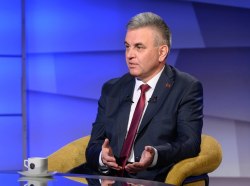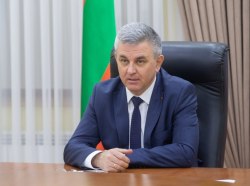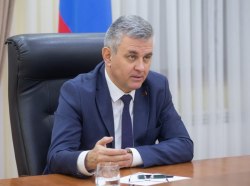Tiraspol, 6 February. /Novosti Pridnestrovya/. The president discussed with Russia's ambassador at large Sergey Gubarev the prospects of the negotiation process between Pridnestrovie and Moldova, the president's press service reports.
Welcoming Sergey Gubarev, Vadim Krasnoselsky addressed words of gratitude to the Russian Federation for active participation in the "5 +2" format. Speaking about the agreements signed at the end of last year, the president stressed that today one should not experience euphoria, but on the contrary, it was necessary to bring to completion the implementation of those agreements.
According to Vadim Krasnoselsky, one of the main achievements of 2017 was the opening of a bridge across the Dniester near the villages of Bychok and Gura Bicului. Since the end of January, the bridge has been available for vehicles with a carrying capacity of up to ten tons.
In the past year, Pridnestrovie and Moldova signed four agreements: on apostille verification of Pridnestrovie-issued diplomas on higher education, communication, land use in the Dubossary district of the PMR and Romanian-language schools. These issues, according to the Pridnestrovian president, are purely humanitarian in nature and are highly relevant in the context of improving the living standards of citizens.
The head of state said during the meeting that the agreement on Romanian-language schools had been fully implemented, adding that all participants in the negotiation process had been informed about it.
There are prospects for a final solution to the land use problem in the Dubossary district.
"We have created a basis for the implementation of this agreement. Now it is Moldova's turn since it has pledged to provide data on individuals who want to receive land in operation," said Vadim Krasnoselsky. According to him, this information has yet to be provided by the Moldovan side.
The president drew the attention of the Russian ambassador to the fact that Pridnestrovie is ready to work actively towards solving four more issues, one of which is the participation of Pridnestrovian motor transport in the international traffic. Last year, Moldova and Pridnestrovye failed to develop a consolidated position on this issue.
"Each side had unacceptable requirements for the other. But all the points, by and large, are of technical nature and should be solved at the level of expert (working) groups," noted president Krasnoselsky.
Such areas of bilateral cooperation as the resumption of fuel deliveries through the Slobodka railway station and banking cooperation are awaiting resolution. Vadim Krasnoselsky recalled that Moldova had repeatedly stated its readiness to unblock the work of the railway station, but there had been no specific actions yet. According to the president, opening correspondent accounts with banks of Ukraine, Moldova and other countries is an urgent necessity for economic entities of Pridnestrovie, many of which trade with the European Union.
Vadim Krasnoselsky told the Russian diplomat that Moldova and Pridnestrovie were ready to sign a protocol agreement on phytosanitary and veterinary control. "The unresolved nature of this issue complicated the work of economic entities of our republic. This could become a new page in the relations between Moldova and Pridnestrovie," underscored the president.
Vadim Krasnoselsky emphasized that Pridnestrovie was interested in Russia's active participation in the negotiation process. "We will continue to coordinate our plans and actions with the guarantor state. Pridnestrovie is aimed at finding new venues for voicing its position, the essence of which remains the same - independence with the subsequent recognition of the country," said the president.
Sergei Gubarev thanked Vadim Krasnoselsky for detailed information on the situation in the negotiation process, stressing that such meetings give an opportunity not only to "check watches", but also to develop a unified position on the most pressing aspects of the negotiating agenda.
"It is important that nice words which are written on beautiful white paper should be embodied in concrete cases, especially because the set of agreements reached last year is aimed at improving people's living standards," noted the Russian diplomat.
The ambassador spoke about his meeting with the political representative of Moldova in the negotiation process, Cristina Lesnik, who highly appreciated the actions of the Pridnestrovian leadership aimed at implementing the agreements between the two states. "The vice premier admits that Pridnestrovie has fully fulfilled its part of the action and now 'the ball is on the Moldovan side'," said Sergei Gubarev.
According to him, efforts should be focused today on developing a mechanism to ensure the practical implementation of the agreements. "The mechanism of guarantees approved and signed by the negotiating parties is an instrument without which it is difficult to move forward," Gubarev believes.
The interlocutors expressed hope that the new special representative of the OSCE Chairman-in-Office on the Moldo-Pridnestrovian settlement, Franco Frattini, would soon visit Pridnestrovie and Moldova and make efforts to resume the regular work of the negotiation format of the "Permanent Meeting..."










